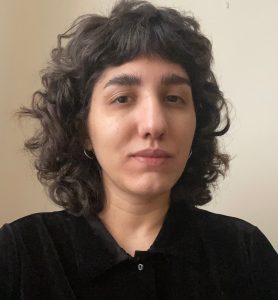This series of profiles highlight valued student employees from across the Libraries, including Flor Barceló, a graduate assistant at the Rare Book & Manuscript Library. The Libraries are the largest employer of students on campus. We couldn’t serve our users without them!

Q: Which library do you work at and what is your title?
I am currently working as a graduate assistant at the Rare Book & Manuscript Library, which is located at Butler Library. I started as an intern during the summer of 2023.
Q: What does your job entail?
My job consists of processing oral history collections that were mostly recorded in Spanish. I listen to the audio and/or read the transcripts so that I can create a description of them. The description includes a biographical note, a summary, and all the information that could be useful for the users. I create the content scope both in English and Spanish so that we can reach a broader audience.
Q: Could you describe the most rewarding part of working at the Libraries?
I think the most rewarding part of my job is creating content in Spanish. I know that some users can benefit from the descriptions in Spanish since the collections are in that language.
Q: What is your area of study?
I am a Ph.D. student in the Department of Latin American and Iberian Cultures. I am currently working on the relationship between neoliberalism and the LGBTQ+ community in Spain and Argentina (the country where I am from) during the 1980s, 1990s, and 2000s. I mostly work with fanzines and magazines produced by LGBTQ+ organizations.
Q: Of the libraries on campus, which is your favorite place to study?
I enjoy studying in Avery Library’s basement.
Q: What do you consider to be a “hidden gem” at the library where you work?
When I started working at the RBML, one of my colleagues showed me the Albert Field Collection of Playing Cards. It is definitely a hidden gem at the library.
Q: You recently worked with the Cuban Voices oral history collection, which is composed of interviews with Cuban citizens whose narratives do not appear in conventional narratives. What was your biggest takeaway from this project? What surprised you most?
I did not have any previous experience working in a library when I encountered this collection, so I had to learn everything from scratch. I think what surprised me the most about the collection is the number of topics it comprises: religion, racism, machismo, and the Revolution and its aftermath. The collection has so many different perspectives that usually contradict each other. I think it is a good start for anyone who wants to know more about Cuba’s present and recent history.
Q: What book are you currently reading?
I am currently reading LatinX by Claudia Milian, who is an associate professor and Director of the Program in Latino/a Studies in the Global South at Duke University. Nowadays, I have been intrigued by Latinx genealogies and their horizons, and this book has been very enriching.